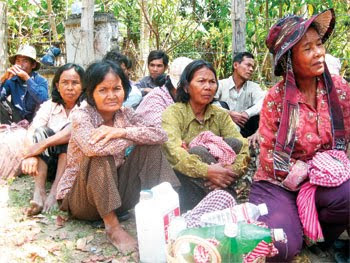via CAAI News Media
Friday, 12 March 2010 15:06 James O'Toole
THAI officials rejected calls from civil society groups to halt the planned deportation of migrant workers, including tens of thousands from Cambodia, during a meeting held this week before the Thai government’s National Human Rights Commission.
At a public meeting on Wednesday, officials from Thailand’s Ministry of Labour discussed their migrant policy and provided updated statistics on the number of migrant workers who registered on time to participate in the process of nationality verification through their home governments, which would allow them to secure renewed permits to work in Thailand.
Although the numbers have not yet been finalised by the Thai Ministry of Labour, statistics distributed at Wednesday’s meeting stated that 81,601 Cambodian workers, out of the 124,902 eligible for the programme in Thailand, had applied for nationality verification by the March 2 deadline.
“If they didn’t apply [by] that date, they cannot work,” said Supat Guukhun, deputy director general of the employment office at Thailand’s Ministry of Labour. Workers who are deported may reapply from their home countries to return to Thailand “through legal channels”, Supat added.
Among the attendees at Wednesday’s meeting was Andy Hall, director of the Migrant Justice Programme at the Human Rights and Development Foundation in Thailand, who said Thai officials had made it clear that workers who missed the deadline are now considered illegal migrants, and may thus be subject to “detention, arrest and deportation”.
To account for workers lost to deportation, Thailand has set a quota of 58,000 for the number of new Cambodian workers who may be granted work permits in addition to those who are currently registered, Supat said, with 17,000 new applications having been processed thus far.
Bruno Maltoni, project coordinator at the Phnom Penh office of the International Organisation for Migration, said Thursday that Thai plans to deport thousands of migrants from Cambodia and elsewhere were likely unrealistic.
“On the Cambodian side, obviously there are worries because there is the danger of a lot of deportations in the near future, but at the same time it’s difficult to say … that the Thai government has the human resources to put the deportations in place,” Maltoni said.
In 2006, Maltoni noted, Thailand announced similar plans to deport thousands of unregistered workers, though these plans were ultimately curtailed.
“I don’t think [deportations] would last very long, because they would really put a strain on the Thai police,” Maltoni said.
Hall agreed, saying it would be “very difficult” for Thai authorities to round up the more than 500,000 legal migrants who missed last week’s deadline, as well as the more than 1 million illegal migrants estimated to be living in Thailand.
Though Thai officials say the nationality verification process is meant to regularise migration and extend social services enjoyed by Thai citizens to migrant workers, Hall said a failure to extend the registration deadline and reopen the process would leave Thailand’s immigration system in disarray and many workers at greater risk of abuse.
“Workers are going to be subject to systematic exploitation,” Hall said. “They’re going to be arrested, their money’s going to be extorted from them, and they’re going be released.”
Ministry of Foreign Affairs spokesman Koy Kuong said Cambodia had no objection to the deportations, adding that he hoped Cambodian workers deported from Thailand would stay and seek work within the Kingdom. “This is the internal affair of Thailand to implement their immigration law,” Koy Kuong said. “We will welcome [migrant workers] back if they are deported back to Cambodia.”





































